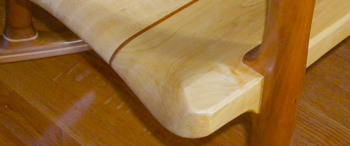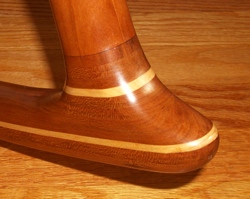The Best Custom Rocking Chairs Have Strong, Tight and Beautiful Joints.
Custom rocking chairs need high quality joinery in order to have strength and beauty throughout their long life.
Joinery, the way of fixing two things together, may not seem exciting, but it is absolutely critical to the life of your rocker. Inferior joints not only look bad, they give out far too soon.
Making the best joint starts with good design and sound engineering principles. Thankfully, great joinery has been around for thousands of years. This knowledge base is a very helpful resource for the craftsman.
A really good quality joint has several important characteristics.
- A good joint makes two or more boards seem like one piece.
This simply means that the attachment line (glue line) between each piece is vanishingly thin. (As seen the photo below) The two pieces seem to touch each other in a solid, uniform way. There are no uneven spots or gaps which could weaken the part.

- A good joint does not wiggle or move unless it is designed for movement.
Custom rockers sometimes have joints (such as those for the back slats) designed to move a little bit. This movement counters the natural shrinking and swelling of wood and can also compensate for normal bending. Most of the chair joints, however, should not move.
If the contact surfaces are not glued or attached properly, a tight-looking joint can actually open up during use. This is not good for your custom rocking chair, and the "starved" joint will fail over time.
- A good joint must have the best attachment materials (adhesives, screws, dowels, etc) in its construction.
The right materials allow the well-prepared surfaces to mate properly and securely. Poor glue and inferior screws or dowels will greatly reduce the longevity of the joint. Talk to the craftsman about what materials are used for putting the joints together. The more you know about the joinery used in making the rocker, the better.

- A good joint must LOOK good too!The most secure joint in the world will fail the all-important visual test if it is not pretty. The rocking chair leg at the right has mostly exposed joinery, and great looking joints really add to the overall beauty of the chair.Clunky or ugly joints look unprofessional and cheap. A good-looking joint is pleasing to the eye, harmonious to the heart, and what YOU deserve!
As you can see, superior joinery is a really important aspect of custom rocking chairs. The best chair makers incorporate interesting and stable joinery into their rockers. Building beautiful joints for your rocker is one very important part. Another important part can be found here at the Finishing Process tab.
Return from Joinery to Materials Selection.



